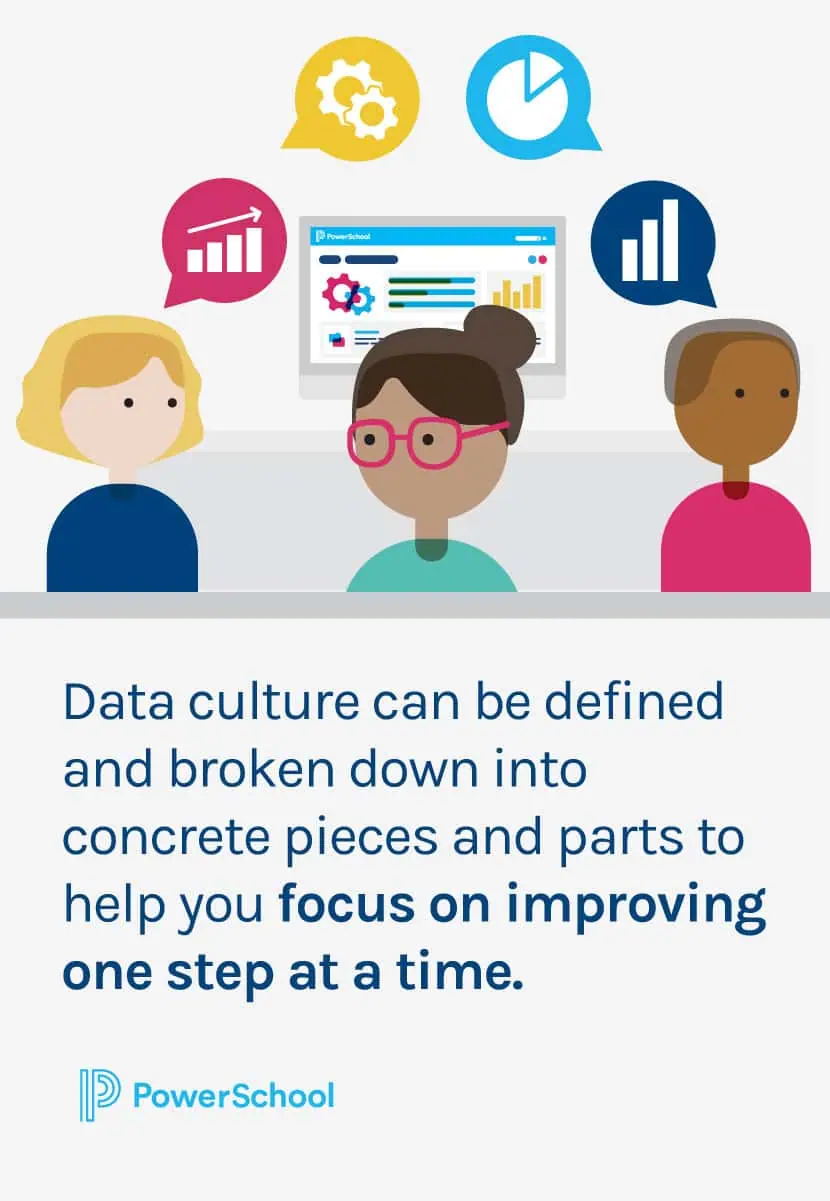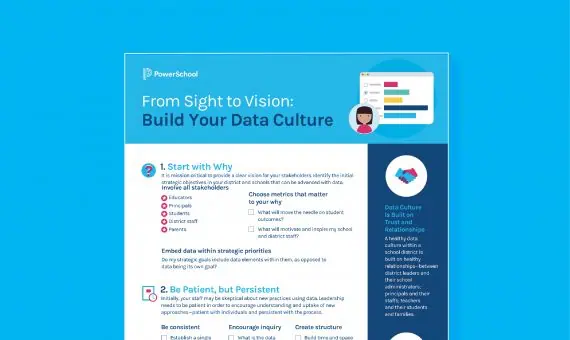Written by
Sarah Singer
•Director, Education Solutions, PowerSchool
The question isn’t whether your school or district has a data culture. I guarantee it does. The question is whether it has a positive one. In other words, does it have a culture that supports continuous improvement and propels strategic priorities, improving student outcomes along the way?
Data culture that’s not good inhibits progress in many ways. I’ve seen cultures of “toxic positivity,” where only good news is allowed. I’ve seen data used primarily to punish educators or point out fault. As a result, authentic self-reflection can be jeopardized, and data collected or reported incorrectly. I’ve seen cultures where “analysis paralysis” is the norm, and action is avoided to an extreme.
But I’ve also seen the opposite, where leaders expect and model effective data use. Where data is aligned tightly with a district’s strategic priorities. Where data is used to self-reflect and improve one’s practice. Where data use is embedded within the workday and school routines – and treated more like the air we breathe as opposed to a separate and distinct activity.
Why Effective Data Use is Critical for Educational Initiatives
Why does data culture matter? It matters because the success of your key initiatives depends on effective data use. Continuous improvement cycles in education, such as PDSA (Plan, Do, Study, Act) cease to function without data. PLCs (Professional Learning Communities), MTSS (Multi-Tiered System of Supports), and school improvement planning similarly rely on data to fuel their processes.
Yet, positive data culture can feel like a vague concept, something you either have or you don’t. It doesn’t have to be that way. Building a positive data culture isn’t an obscure, magical process.
A team of former educators at PowerSchool developed a data culture self-assessment that breaks data culture into six components, each containing four recommended best practices. The assessment gauges where you are and provides recommended next steps based on your results.
5 Reasons to Take the Self-Assessment and Improve Your District’s Use of Data
- You feel like your district’s use of data is ineffective but can’t put your finger on why. Culture can be felt but not always seen, making it difficult to change. When we make our culture visible, it’s easier to improve. This survey will put into words some of what you have felt around your data culture.
- You want to improve your implementation of MTSS. Effective data use is foundational to MTSS. Do you have enough time for educators to collaborate around the use of data? Can they view holistic sets? These are just a few of the questions that the survey will assess – all critical to MTSS implementation.
- You want to improve implementation of any strategic initiative. Continuous improvement cycles are a key component to successful implementation. Effective data use is embedded within continuous improvement cycles.
- You want to increase usage and adoption of an existing data platform. Usage and adoption of a data platform may be compromised for many reasons. It could be that end users simply don’t have awareness that the platform exists. It could be that there is not enough time built into an educator’s day to collaborate and review data. It could be that there is a data quality issue so educators distrust the data within the platform. It’s important to understand underlying issues before focusing valuable time trying to increase usage.
- You want to roll out a new data platform. Your investment is only a good one if it gets used. Understanding strengths and weaknesses of your data culture will be invaluable as you think about how to roll out your new platform.
The self-assessment can be taken by anyone in your school or district and will consume about 3-5 minutes of your time. Feel free to take it as a team to see if answers diverge and discuss your results collectively. The discussion you have as a group will be as illuminating as the results themselves. At the end of the day, data culture exists within every organization. Like almost everything, it can probably improve in some way. If you are curious to learn how, the data culture self-assessment might be a good starting place for your organization.
About the Author
Sarah Singer, Director, Education Solutions
Sarah Singer brings more than 15 years of education experience to her role at PowerSchool. She now helps K-12 education agencies create strategic plans for building a data-driven environment. Sarah entered Portland Public Schools in 2007 as a Broad Resident in Urban Education, a national and highly selective two-year management development program that recruits and trains emerging leaders for senior management positions in public education. She went on to serve as the Senior Advisor to the Chief Academic Officer. Later, she oversaw the district’s Research, Evaluation, Assessment, Administration, and Analytics Departments.
Data Culture Self-Assessment
Learn where your organization stands in its data culture journey.
Take the Assessment



